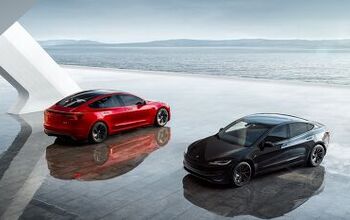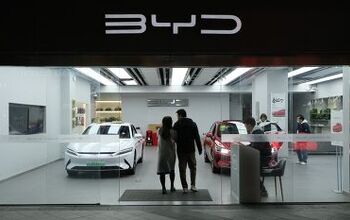What’s the Deal With Synthetic Fuels?

Following news that the European Union had delayed voting on the prospective banning of the internal combustion engine, Porsche and Ferrari have reportedly been doing their utmost to encourage exemptions for synthetic fuels. Presented as an alternative to gasoline and diesel, “e-fuels” would theoretically allow the automakers to continue selling traditional engines while offering fuels they claim would be less harmful to the environment.
However, cutting through the industry rhetoric on this will be important. Despite assurances that synthetic fuels would reduce greenhouse gas emissions, there are a lot of lingering questions about e-fuels.
The premise being offered by the industry is that Europe could carve out exceptions on forthcoming vehicle bans that would allow combustion-engined automobiles to persist by leaning on liquid fuels using renewable or zero-emission energy sources. This means e-fuels are created using things like wind, solar, or other renewable resources and stem-captured carbon – rather than having to be drilled out of the ground.
Though the carbon-neutrality aspect of the scheme is a little confusing. Synthetic fuels are made by combining captured carbon dioxide with hydrogen that was split from water. While burning the fuel does indeed emit carbon dioxide, it’s claimed that the whole process is “climate neutral” due to the fact that the energy used to create it stems from renewable energy and that the captured carbon would have been sent into the atmosphere (or buried) if not repurposed.
Another possible pro is the suggestion that these fuels could be made more energy dense than traditional fuels. Mixtures could be made to work in older engines (perhaps even mixed in with regular gasoline) or custom developed for newer, ultra-efficient powertrains.
Based on some of the efficiency breakthroughs we’ve seen with natural gas plants using carbon capture tech, there’s reason to believe that there could be something to this whole synthetic fuel idea. However, the actual benefits are difficult to quantify and would be heavily dependent upon a slew of factors pertaining to how the fuels are made. We don’t really want another repeat of ethanol, which benefited corn farmers but was hardly carbon neutral. Cost is another factor, with e-fuels being significantly more expensive than diesel or gasoline.
The American Chemical Society published a paper in 2016 attempting to determine the overall efficiency and average cost of e-fuels and wound up estimating that they would be seriously expensive.
The report speculated that synthetic fuels would be somewhere between $3.80 to $9.20 per gallon when citing data from 2010. Those numbers would be significantly higher today and would presumably remain high until the refinement process was improved and renewable energy prices came down. Porsche, which is the automaker leading the charge on e-fuels, has likewise suggested that the per-gallon rate for synthetic gasoline could eventually settle around $7.50. But it’s also said it could be nearer to $40 per gallon until the industry gets its ducks in a row.
Those prices are likely acceptable for anyone operating a manufacturer-backed racing team. In fact, Formula One has already announced it’ll be swapping over to synthetic fuels for the 2026 season. Ferrari owners also probably don’t fret over what the readout is at the pump. But regular drivers aren’t going to want to pay double-digit prices for a gallon of gasoline just so they can get to work.
While Italy is also pressing the European Commission to consider exemptions for e-fuels, Germany has the most skin in the game. Having been starved for resources during World War II, the nation helped advance ways of converting coal into synthetic liquid fuels. German chemical companies continue to lead the way in 2023, with Volkswagen Group (who owns Porsche) having some relevant partnerships in the energy sector. Porsche has even invested in an e-fuel plant in Chile, saying it doesn’t see the 911 as going all-electric and would need liquid fuels for the foreseeable future.
Other German brands have stated their intention to run with combustion vehicles a little longer, tweaking them to comply with the Euro-7 emissions regulations coming in 2025. But most don’t have any plans to pursue internal-combustion development after that. Suppliers are also gearing up for the shift toward electrification, as they’re operating under the assumption that the industry has invested too much money to back out now.
“The automotive industry’s electrification trend is at this point a kind of runaway train,” Roberto Vavassori, an executive at the Italian brake maker Brembo, told Automotive News. “It could be even worse to halt or delay because of the huge amount of carmakers’ investment.”
“...the main question is how and where are we going to find all the clean energy the electric transition process needs since we could realize that Europe will not be ready for that, in terms of infrastructure, in 2035.”
With Germany and Italy opposing the current regulation attached to combustion bans, the European Commission has opted to hold talks over the next several weeks on how to integrate synthetic fuels into regulatory proposals.
From Automotive News:
Germany and Italy's opposition to the ban, after they had earlier agreed to the proposed legislation, shook Brussels, and reopened questions around supposedly climate-neutral e-fuels that have proven too costly for large fleets of vehicles. But it also revealed deeper questions about the economic and social forces at play in Europe’s transition to green tech.
Cars are at the cultural core of Germany, which remains the only European nation with no speed limits on stretches of its famed autobahn – a perennial thorn for environmentalists.
And opposition to the proposed EU law illustrates the nation’s reluctance to bid farewell to some of its quintessential symbols, like Porsche’s 911.
But the efforts to slow the EU law at such a late stage has stoked criticism within the auto industry. With manufacturers pouring billions into bringing electric cars to market, many do not want distractions from an expensive potential alternative.
“I would call it now almost pathetic,” Thomas Ingenlath, CEO of luxury brand Polestar, said in an interview. “The industry and the politicians should finally give that very clear signal about what is the journey ahead.”
Pathetic or not, Ferrari and Porsche have both said they intend to pursue alternative fuels so they could continue building combustion engine vehicles that preserve their heritage as automakers. Meanwhile, the European Commission already made special rules that allowed low-volume niche manufacturers to be a year behind larger automakers in terms of which emissions regulations they had to follow – showcasing just how much sway automakers have in terms of how they’re regulated in the EU.
But some of the opinions pertaining to vehicle bans are coming directly from the citizenry. Despite widespread concerns that EV mandates will eliminate thousands of manufacturing jobs, Germans are less than enthralled by the prospect of having to depend on foreign entities to supply their energy needs. Leadership botched the transition to renewables, forcing the country to lean heavily upon coal. But its people have likewise grown tired of having to be dependent upon Russian oil. American influence tied to the petrodollar has similarly become a sore spot for German voters, so anything that can make the country more energy independent is typically viewed as a good thing.
Meanwhile, consumer acceptance of all-electric vehicles appears to be moving in the wrong direction. Based on a November 2022 survey from Nordlight Research, three-quarters of German drivers said they want their next car to have a combustion engine. Perhaps tapping into synthetic fuels will be a good compromise – or maybe the whole regulatory situation has devolved into an untenable slurry of government intervention and corporate influence. Whatever the scenario, these regional disputes are holding up regulatory actions that EU member states previously seemed to be in broad agreement about but were viewed as overbearing by swaths of the general public.
[Image: Nounpusher Photography/Shutterstock]
Become a TTAC insider. Get the latest news, features, TTAC takes, and everything else that gets to the truth about cars first by subscribing to our newsletter.

A staunch consumer advocate tracking industry trends and regulation. Before joining TTAC, Matt spent a decade working for marketing and research firms based in NYC. Clients included several of the world’s largest automakers, global tire brands, and aftermarket part suppliers. Dissatisfied with the corporate world and resentful of having to wear suits everyday, he pivoted to writing about cars. Since then, that man has become an ardent supporter of the right-to-repair movement, been interviewed on the auto industry by national radio broadcasts, driven more rental cars than anyone ever should, participated in amateur rallying events, and received the requisite minimum training as sanctioned by the SCCA. Handy with a wrench, Matt grew up surrounded by Detroit auto workers and managed to get a pizza delivery job before he was legally eligible. He later found himself driving box trucks through Manhattan, guaranteeing future sympathy for actual truckers. He continues to conduct research pertaining to the automotive sector as an independent contractor and has since moved back to his native Michigan, closer to where the cars are born. A contrarian, Matt claims to prefer understeer — stating that front and all-wheel drive vehicles cater best to his driving style.
More by Matt Posky
Latest Car Reviews
Read moreLatest Product Reviews
Read moreRecent Comments
- MaintenanceCosts Thing mentioned in the article: 77 pounds lighter than the standard version!Thing not mentioned in the article: The "lighter" curb weight is 3902 pounds. That is a few pounds heavier than my 2011 335i *convertible*.
- Carson D Printing a trillion dollars every hundred days was not the cause of inflation.
- Carson D The Mercedes-Benz safety car with the Mercedes-Benz-contracted touring car driver picking up the second place Red Bull Honda so the leading McLaren-Mercedes-Benz could retain its lead after pitting was some Roger Penske-caliber shenanigans.
- Fahrvergnugen The only GP we watch - and attend - is SailGP. Feeds a slightly different bunch of adrenaline junkies, though there must be some overlap.
- SCE to AUX Fisker filed for reorganization in Austria - the end is near.https://insideevs.com/news/718875/fisker-reorganization-austria/


































Comments
Join the conversation
The only way forward
"What’s the Deal With Synthetic Fuels?
"
The same as the deal with "AI," "BEVs" and the rest: Dumb and Dumber talking dumb stuff they're both vasty to dumb to comprehend. Confident that Dumbest over in government, will come to the rescue of their childish fantasies, by robbing whomever is a bit less dumb and hence are involved in something real.